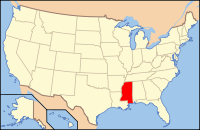Leflore County
| Leflore County, Mississippi | |
|---|---|

Leflore County Courthouse
|
|
 Location in the U.S. state of Mississippi |
|
 Mississippi's location in the U.S. |
|
| Founded | 1871 |
| Named for | Greenwood LeFlore |
| Seat | Greenwood |
| Largest city | Greenwood |
| Area | |
| • Total | 606 sq mi (1,570 km2) |
| • Land | 593 sq mi (1,536 km2) |
| • Water | 14 sq mi (36 km2), 2.3% |
| Population | |
| • (2010) | 32,317 |
| • Density | 55/sq mi (21/km²) |
| Congressional district | 2nd |
| Time zone | Central: UTC-6/-5 |
| Website | www |
Leflore County is a county located in the U.S. state of Mississippi. As of the 2010 census, the population was 32,317. The county seat is Greenwood. The county is named for Choctaw leader Greenwood LeFlore, who signed a treaty to cede his people's land to the United States in exchange for land in Indian Territory. LeFlore stayed in Mississippi, settling on land reserved for him in Tallahatchie County.
Leflore County is part of the Greenwood, MS Micropolitan Statistical Area. It is located in the Mississippi Delta region, with its southern border formed by the Yazoo River. Its riverfront lands were developed before the Civil War as cotton plantations. More inland areas were developed in the later 19th century.
Leflore County, which is still largely rural, is noted for having the highest level of child poverty of any county in the United States. Mechanization of agriculture reduced jobs available for many workers in the 20th century, and there are few opportunities. The population has declined dramatically since its peak in 1930 as people continue to leave for opportunities elsewhere.
Leflore County was formed in 1871 during the Reconstruction era from portions of Carroll, Sunflower and Tallahatchie counties. It was named for Greenwood Leflore, a Choctaw chief. During the period of Indian Removal in the 1830s, he was one of the chiefs who signed the Treaty of 1830, by the terms of which the Choctaw sold to the US their remaining lands east of the Mississippi River. Most Choctaw migrated to the Indian Territory (now Oklahoma), but Leflore and some others remained in Mississippi. He became a state and US citizen, a planter owning African-American slaves, and at times served as a politician.
...
Wikipedia
